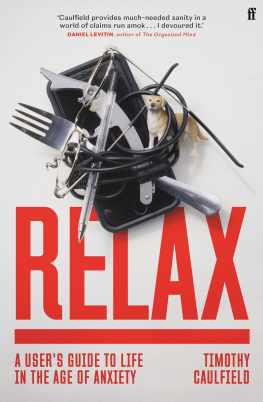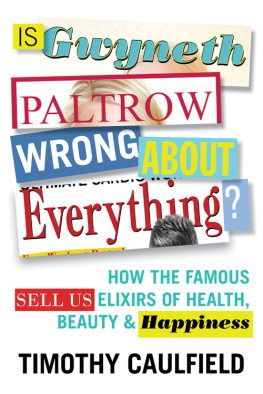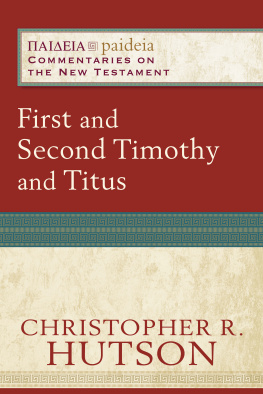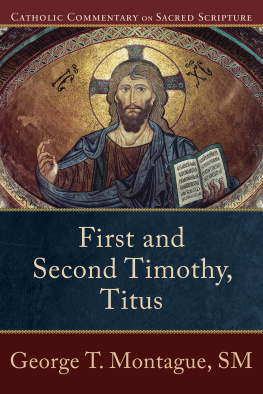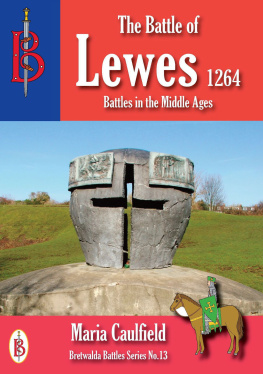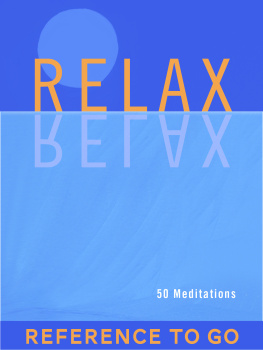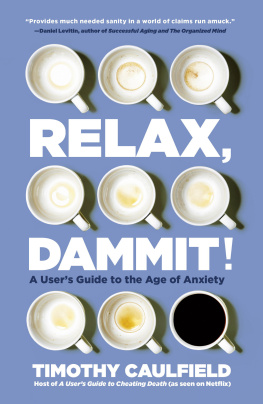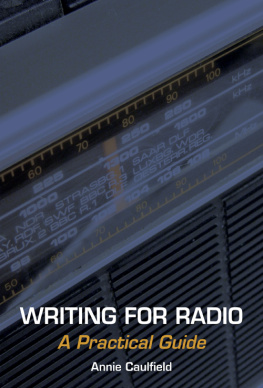Timothy Caulfield - Relax
Here you can read online Timothy Caulfield - Relax full text of the book (entire story) in english for free. Download pdf and epub, get meaning, cover and reviews about this ebook. year: 2020, publisher: Faber and Faber, genre: Children. Description of the work, (preface) as well as reviews are available. Best literature library LitArk.com created for fans of good reading and offers a wide selection of genres:
Romance novel
Science fiction
Adventure
Detective
Science
History
Home and family
Prose
Art
Politics
Computer
Non-fiction
Religion
Business
Children
Humor
Choose a favorite category and find really read worthwhile books. Enjoy immersion in the world of imagination, feel the emotions of the characters or learn something new for yourself, make an fascinating discovery.
- Book:Relax
- Author:
- Publisher:Faber and Faber
- Genre:
- Year:2020
- Rating:4 / 5
- Favourites:Add to favourites
- Your mark:
- 80
- 1
- 2
- 3
- 4
- 5
Relax: summary, description and annotation
We offer to read an annotation, description, summary or preface (depends on what the author of the book "Relax" wrote himself). If you haven't found the necessary information about the book — write in the comments, we will try to find it.
Relax — read online for free the complete book (whole text) full work
Below is the text of the book, divided by pages. System saving the place of the last page read, allows you to conveniently read the book "Relax" online for free, without having to search again every time where you left off. Put a bookmark, and you can go to the page where you finished reading at any time.
Font size:
Interval:
Bookmark:

To science. Hang in there.
Y oure going to feel pretty bad if your son dies! Youre going to feel horrible!
This was my sister-in-laws mic drop retort to an intense debate we were having about risk. It happened at a family Sunday dinner. I had just told the collected kinfolk that I had decided to go skydiving. Ten thousand feet, mostly free-fall.
Everyone thought I was crazy. I am pretty sure most of them entertain this sentiment on a fairly regular basis, so the thought of Uncle Tim plummeting to the earth at terminal velocity wasnt what ignited the debate. What really upped the family angst was that I planned to take my 14-year-old son, Michael.
We make a ridiculous number of decisions every day. Some estimates are that the number hovers in the thousands; we make hundreds of decisions daily about food alone. We make decisions about when to wake up, how to brush our teeth, what to have for breakfast, the amount of coffee to drink, how to get our kids to school, and on and on.
This book is structured around the decisions we make throughout a typical day, from when we wake up to when we go to sleep. In between, I explore dozens of different choices. Some touch on issues that are relatively frivolous and fun: Should you sit on a public toilet seat? What is the best way to park your car? Is ranting to your work colleague a good idea? Should you cuddle after sex? Others are more serious and controversial: Should you let your kids walk to school? Should you step on a weigh scale in the morning? Should you feel guilty about not spending enough time with your kids? For some of the topics I provide an overview of the history of a particular decision and an analysis of the social forces distorting the evidence and public discourse. Others I deal with briefly, delivering just the facts. The goal is to provide a useful summary of what the evidence says about a particular decision, but also to give insight into how cultural, historical, and scientific forces take hold of and shape our thinking on a wide range of issues relevant to our day-to-day lives.
I realize that relying on evidence isnt the only way people make decisions, but I think that a journey through a typical day of decisions will allow us to recognize that, more often than not, we can relax. It probably doesnt really matter as much as we think. In a world where information is increasingly twisted for commercial, ideological, and personal gain, finding a path to the objective truth on any topic, from toothpaste to toilet seats, can be difficult. But the path does exist, and finding it can be liberating.
But first, lets look at what goes into making our decisions.
Making decisions is tough work. Indeed, it tires us out. It can cause stock analysts to perform progressively worse over the course of a day. It can lead us to make poor choices about what to eat (the more tired our brains are, the more junk food we consume). It can change how physicians prescribe drugs and how judges handle sentencing. And the more deliberate the decisionsthat is, the more we think through themthe more fatiguing they are.
Decision-making is a complex, messy activity that can lead to significant stress. But it doesnt have to. One of the goals of this book is to remind us not to fall prey to the numerous social forces that increasingly turn making a decision into an unnecessarily anxious process. If we can look past the popular culture noise, marketing pressures, and ideologically motivated spin, we can often find a science-informed, and less stressful, way forward.
And I hope to also provide useful context about our daily choices, allowing you to look at many of them in a new lighteven if it doesnt change your mind. But what this book is really about is the justifications behind our decisions and the cultural, historical, and scientific forces that shape the evidence we use to inform them.
We all want to make the right decisionsor, at least, the decisions that are right for us. We select a particular food because we believe it is healthier or is better for the environment. We brush and floss our teeth because we dont want them to fall out. We say no to another cup of coffee because too much caffeine might be bad for us. We drive our kids to school because we worry about their safety. We avoid sitting on public toilet seats so we wont pick up germs. We take a nap in the afternoon because weve been told it will boost our productivity. We try not to obsessively check our email, as weve been told doing so will stress us out. We stand because sitting is the new smoking. We take vitamins because we want to stave off disease. We vent our rage because we have been told a cathartic release is psychologically beneficial. And if we are asked about why we made a particular decision, most of us will muster some relatively coherent rationale: it is healthier, safer, tastier, or, simply, better.
But as we will see, many of these rationales and beliefs do not fit with the evidence. From the moment we wake to the moment we drift off to sleep at night, we make dozens and dozens of decisions that are based, to a lesser or greater extent, on misinformation.
I am not saying that we are all hyper-rational beings who seek to only make decisions that accord with the facts. On the contrary, innumerable cultural, social, and psychological forces shape the decisions we make. And our rationales for a decision are often tacked onto our actions after we have made our decision. That is, we make a decision first and then, consciously or unconsciously, we construct reasons why it was the correct one, reasons that fit the decision, our personal identity, or our desire to be seen as consistent or logicaleven if the original motive for the decision might be different or even unknown to us.
We do this is as a way to avoid what is called post-decision dissonance. Studies have found that after choosing, for example, a new job or which university to attend, people will rank the attributes of their chosen institution higher than they did before making their decision andno surpriserank the attributes of the loser lower. In addition, we make decisions that allow us to feel we are being consistent. So past decisions shape future decisions. For instance, perhaps you bought GMO-free food because you already buy organic food and that seemed like a consistent pattern and fit with your personal image. You then need a rationale to justify this decision, even though what influenced your food choice was simply the drive to be consistent. And once the decision is made you must become more committed to the rationale, because now it is part of how you perceive yourself.
We all do this kind of thing. You do it. I do it.
Having perfect knowledge of the available science will not lead to a world of strictly science-informed decisions. Still, exploring the deep disconnect between the rationales and beliefs behind our decisions and what the actual science says provides an opportunity to dive deep into three harmful, and increasingly pervasive, social paradoxes. Indeed, I believe these paradoxes have become significant and less than laudable hallmarks of our time. And all three make decision-making more difficult and infinitely more stressful.
First, there is the knowledge-era paradox. We live in a world awash in information. There has never been as much science-informed knowledge as there is now. It has been estimated that the global scientific output doubles every nine years. Since 1665, when the first academic journals were produced in France and Britain, more than 50 million scholarly articles have been published. And approximately 2.5 million new scientific papers are published each year. Not all of these papers are useful to our day-to-day decision-making, of course, but these numbers give a sense of the growth and quantity of scientific inquiry. There is a lot of information out there. And there has never been such easy access to that information. So youd think that our decisions would increasingly be informed and evidence-based.
Font size:
Interval:
Bookmark:
Similar books «Relax»
Look at similar books to Relax. We have selected literature similar in name and meaning in the hope of providing readers with more options to find new, interesting, not yet read works.
Discussion, reviews of the book Relax and just readers' own opinions. Leave your comments, write what you think about the work, its meaning or the main characters. Specify what exactly you liked and what you didn't like, and why you think so.

